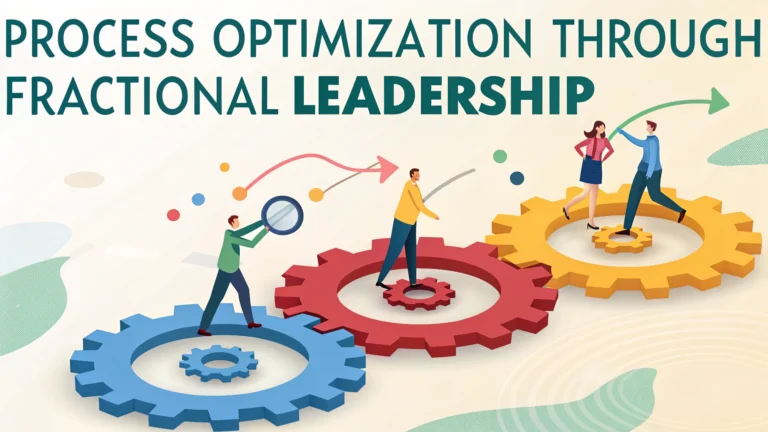Fractional leadership allows businesses to access executive expertise without committing to full-time C-suite salaries.
Organizations can bring in experienced Chief Operating Officers on a part-time or project basis to optimize processes, implement new systems, and drive operational excellence.
This guide explores how fractional COOs can transform business operations through strategic process optimization and interim leadership.
What is Process Optimization Through Fractional Leadership?
A fractional COO typically works with multiple companies simultaneously, bringing deep operational expertise and best practices from various industries.
These leaders specialize in analyzing existing workflows, identifying bottlenecks, and implementing solutions that enhance efficiency and scalability.
Key Benefits of Hiring a Fractional COO
- Cost-effective access to executive expertise
- Fresh perspective on operational challenges
- Flexible engagement terms based on business needs
- Rapid implementation of proven processes
- Objective analysis of organizational inefficiencies
- Knowledge transfer to existing team members
Common Process Optimization Areas
| Area | Potential Improvements |
|---|---|
| Workflow Management | Streamlined procedures, automated tasks, reduced redundancies |
| Resource Allocation | Optimized staffing, better resource utilization |
| Technology Integration | Implementation of new tools, system upgrades |
| Quality Control | Enhanced monitoring, reduced errors, consistent output |
Implementation Strategy
- Assessment Phase: Document current processes and identify improvement opportunities
- Planning: Develop targeted solutions and implementation timeline
- Execution: Roll out changes systematically with proper team training
- Monitoring: Track results and make adjustments as needed
- Knowledge Transfer: Ensure sustainability of improvements after engagement ends
Measuring Success
Track key performance indicators (KPIs) specific to your optimization goals:
- Cycle time reduction
- Cost savings
- Employee productivity
- Customer satisfaction scores
- Error reduction rates
Finding the Right Fractional COO
Look for professionals with:
- Proven track record in your industry
- Strong references from similar engagements
- Clear communication style
- Relevant technical expertise
- Experience with change management
Taking Action
Contact professional networks and fractional executive platforms to find qualified candidates:
- CEOxen – Fractional executive matching platform
- LinkedIn – Professional networking
- Local business leadership organizations
Next Steps for Success
Begin with a clear scope of work and defined objectives for your fractional COO engagement.
Set realistic timelines and expectations for process improvements.
Ensure full team buy-in and support for the optimization initiatives.
Managing the Transition
Successful process optimization requires careful change management and stakeholder engagement. The fractional COO should:
- Communicate changes clearly to all team members
- Address concerns proactively
- Provide adequate training and support
- Document new procedures thoroughly
- Establish feedback mechanisms
Overcoming Common Challenges
Resistance to Change
Address employee concerns through transparent communication and demonstration of tangible benefits.
Technology Adoption
Implement proper training programs and select user-friendly solutions that align with team capabilities.
Resource Constraints
Prioritize improvements based on ROI and implement changes in manageable phases.
Building Long-term Success
Sustainable process optimization requires:
- Regular review and refinement of implemented changes
- Ongoing team training and development
- Documentation of best practices
- Establishment of continuous improvement culture
- Clear accountability structures
Maximizing Your Fractional Leadership Investment
Transform your operations effectively by:
- Setting clear expectations and milestones
- Maintaining open communication channels
- Leveraging the fractional COO’s network and experience
- Planning for knowledge transfer early
- Building internal capabilities for sustained success
FAQs
- What is a fractional COO, and how does it differ from a full-time COO?
A fractional COO is an experienced executive who works part-time or on a contract basis with multiple organizations, providing operational leadership for a fraction of the cost of a full-time COO. Unlike a full-time COO, they typically work with several companies simultaneously, offering strategic expertise without the commitment of a permanent position. - How can a fractional COO help optimize business processes?
A fractional COO can analyze existing workflows, identify inefficiencies, implement automation solutions, streamline operations, and develop standardized procedures. They bring best practices from multiple industries and can quickly identify areas for improvement based on their diverse experience. - What is the typical time commitment when hiring a fractional COO?
Time commitments typically range from 5-20 hours per week, depending on the organization’s needs and growth stage. Arrangements can be flexible and adjusted based on project requirements, strategic initiatives, or seasonal demands. - What are the cost benefits of hiring a fractional COO?
Organizations can save 40-70% compared to a full-time COO’s salary and benefits package. Companies only pay for the time and expertise needed, avoiding costs associated with full-time employment such as healthcare, bonuses, and stock options. - What industries can benefit most from fractional COO services?
Small to medium-sized businesses, startups, scaling companies, and organizations in transition phases benefit most. This includes technology companies, professional services firms, manufacturing businesses, and organizations experiencing rapid growth or operational challenges. - How do fractional COOs measure and track process optimization success?
They use key performance indicators (KPIs), operational metrics, productivity measurements, cost reduction analysis, and ROI calculations. Common metrics include cycle time reduction, cost savings, employee productivity, customer satisfaction scores, and revenue impact. - What qualifications should a fractional COO have for process optimization?
A fractional COO should have extensive operational leadership experience, proven track record in process improvement, expertise in change management, strong analytical skills, and experience with various business management tools and methodologies like Lean, Six Sigma, or Agile. - How long does it typically take to see results from process optimization initiatives?
Initial improvements can be seen within 30-90 days, with more substantial results typically achieved within 3-6 months. Complex organizational transformations may take 6-12 months to fully implement and realize benefits. - What tools and technologies do fractional COOs commonly use for process optimization?
They typically use project management software, process mapping tools, automation platforms, data analytics software, ERP systems, and collaboration tools. Common examples include Asana, Trello, Tableau, Power BI, and various industry-specific solutions.







